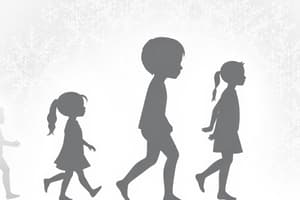Podcast
Questions and Answers
What does maturation refer to in developmental psychology?
What does maturation refer to in developmental psychology?
- Biologically determined changes following an orderly sequence. (correct)
- Changes that only occur during childhood.
- Changes that can be influenced by environmental factors.
- Random changes that occur without any orderly patterns.
What is a critical period?
What is a critical period?
- A period where learning occurs continuously.
- An ongoing developmental stage with no specific time frame.
- A limited time during which a function must be acquired. (correct)
- A time when any learning is not possible.
Which method is best for assessing age changes over time?
Which method is best for assessing age changes over time?
- Longitudinal method. (correct)
- Descriptive method.
- Sequential studies.
- Cross-sectional method.
What is the principal risk of teratogens during pregnancy?
What is the principal risk of teratogens during pregnancy?
Which infant reflex helps guide feeding?
Which infant reflex helps guide feeding?
Which of the following disruptions can occur if measles are contracted during pregnancy?
Which of the following disruptions can occur if measles are contracted during pregnancy?
The fetal period lasts from which weeks to birth?
The fetal period lasts from which weeks to birth?
Which method is NOT useful for examining age differences?
Which method is NOT useful for examining age differences?
What is the primary focus of Piaget’s research on cognitive development?
What is the primary focus of Piaget’s research on cognitive development?
Which statement best illustrates the process of assimilation?
Which statement best illustrates the process of assimilation?
Which cognitive skill is primarily developed in the sensorimotor period?
Which cognitive skill is primarily developed in the sensorimotor period?
At what stage do children begin to struggle with egocentrism?
At what stage do children begin to struggle with egocentrism?
What stage of personality development occurs during adolescence?
What stage of personality development occurs during adolescence?
What defines the conservation task in cognitive development?
What defines the conservation task in cognitive development?
During which developmental stage do children begin to learn independence and face shame and doubt?
During which developmental stage do children begin to learn independence and face shame and doubt?
What does 'centration' refer to in Piaget’s cognitive development theory?
What does 'centration' refer to in Piaget’s cognitive development theory?
Flashcards
Developmental Psychology
Developmental Psychology
The study of how humans change and develop throughout their lives.
Critical Period
Critical Period
A limited time during development where a specific function or skill is most easily acquired.
Cross-Sectional Method
Cross-Sectional Method
A research method that compares different age groups at one point in time.
Longitudinal Method
Longitudinal Method
Signup and view all the flashcards
Teratogen
Teratogen
Signup and view all the flashcards
Fetal Alcohol Syndrome
Fetal Alcohol Syndrome
Signup and view all the flashcards
Infant Reflex
Infant Reflex
Signup and view all the flashcards
Motor Development
Motor Development
Signup and view all the flashcards
Assimilation
Assimilation
Signup and view all the flashcards
Accommodation
Accommodation
Signup and view all the flashcards
Object Permanence
Object Permanence
Signup and view all the flashcards
Egocentrism
Egocentrism
Signup and view all the flashcards
Secure Attachment
Secure Attachment
Signup and view all the flashcards
Anxious-Ambivalent Attachment
Anxious-Ambivalent Attachment
Signup and view all the flashcards
Avoidant Attachment
Avoidant Attachment
Signup and view all the flashcards
Piaget's Cognitive Development
Piaget's Cognitive Development
Signup and view all the flashcards
Study Notes
Introduction to Psychology - Human Development
- Developmental Psychology focuses on how humans develop and change throughout their lifespan.
- Developmental psychology views change as inevitable, occurring across the entire lifespan.
- Change can be continuous (gradual) or discontinuous (in distinct stages).
Core Developmental Issues
- Understanding the interplay of nature (biology) and nurture (environment).
- Maturation refers to biologically determined changes following a predictable sequence.
- Assessing the significance of early experiences, including the concept of critical periods.
- Investigating if development occurs in continuous or qualitative stages.
Critical Periods
- The concept of critical periods suggests a limited time frame for specific brain functions to develop.
- If crucial experiences are absent during a critical period, the development might be impaired or incomplete.
- Examples include the case of Genie, a girl isolated until the age of 13. While she showed some language acquisition, her syntax never reached typical levels. This supports the critical period theory for language acquisition.
- Other examples include diseases such as measles contracted during specific fetal stages, which can cause intellectual impairment.
Developmental Methodology
- Cross-sectional method: compares groups of different ages at the same time. It is helpful for assessing age differences, but not for examining age changes. Different life experiences among cohorts make comparisons unsuitable.
- Longitudinal method: follows the same group across multiple time points. This method, while revealing patterns over time, presents challenges with participant attrition and the influence of cohort effects.
- Sequential studies: involve comparing different age groups at several time points in order to reduce cohort effects. This approach combines cross-sectional and longitudinal approaches.
Prenatal Development
- Prenatal period has 3 phases:
- Germinal Period: First 2 weeks after conception.
- Embryonic Period: 3rd to 8th weeks of gestation.
- Fetal Period: 9 weeks to birth.
Teratogens
- Teratogens are environmental factors (viruses, chemicals, drugs) that can harm a developing fetus during the embryonic stage.
- Examples include:
- Fetal Alcohol Syndrome, caused by the mother consuming alcohol during pregnancy, leading to physical abnormalities and learning disabilities.
- Fetal exposure to crack cocaine affects motor and emotional development.
Infant Reflexes
- Reflexes are innate motor responses triggered by stimuli and are adaptive.
- Examples include rooting (turning towards a touch on the cheek) and sucking reflexes.
Motor Development
- Motor skills develop in a predictable sequence.
- Stages are presented in an image of infants demonstrating increasingly complex movements.
Emotional Development
- Temperament: An individual's characteristic emotional reactivity and intensity.
- Attachment: Refers to the emotional bond between an infant and a caregiver. There are several types of attachment: Secure, Anxious-Ambivalent, and Avoidant.
Cognitive Development
- Piaget's Theory of Cognitive Development focuses on how children's thinking evolves.
- Schemas: organized patterns of thought or behavior that children use to understand the world.
- Assimilation: interpreting new information within existing schemas.
- Accommodation: modifying existing schemas to fit new information.
- Piaget's theory outlined stages of cognitive development from birth to adulthood: Sensorimotor, Preoperational, Concrete Operational, and Formal Operational.
Issues in Cognitive Development
- Object Permanence: Understanding that objects continue to exist even when out of sight.
- Egocentrism: Difficulty seeing things from another's perspective.
- Conservation: Understanding that certain properties of an object remain the same despite changes in appearance.
Conservation Tasks
- Visual examples are given depicting liquid amount, number, and mass conservation tasks showing different stages of children's cognitive development.
Personality Development
- Erik Erikson's stages of psychosocial development are presented as a list, emphasizing conflicts at different life stages.
Studying That Suits You
Use AI to generate personalized quizzes and flashcards to suit your learning preferences.




